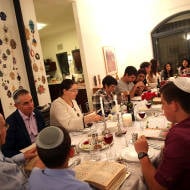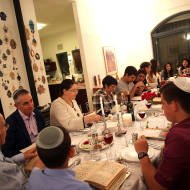
Every Passover Seder Story has Something Special

There was something about this seder that made it a unique experience for us.
By Douglas Altabef, JNS
Just as every aliyah story is fascinating in its own way, every seder story has something very special. Perhaps it is because of the admonition to see ourselves as coming out of Egypt and to ensure that our children understand that they are participants, not just observers.
This year, we held a seder with dear friends at a cabin/tent compound in the southern Golan. We had a large dining hall for our group of 20. The children were happy to ask questions, present ideas, and, of course, act out the wonderful songs that follow the seder.
But there was something about this seder that made it a unique experience for us.
There were two large groups that took over the compound: Ours and an equally large, perhaps even larger, group of Ethiopian families that, like us, had their own dining hall.
The women largely wore traditional dress, while the men looked quite Westernized or, better yet, Israel-ized. They had nice cars and spread a beautiful table.
We gathered together for pre-seder minyanim, and I was struck by the fact that their nussach—their mode of prayer—was indistinguishable from that of our large Ashkenazi shul in Jerusalem. There were two or three intermarried couples, so one could see firsthand that they were making their way into the warp and woof of Israeli society, as had every other group before them.
I asked where they were from and they proved to be from all over the country, another sign of their embrace of Israeli life.
This was intriguing and, in its way, exciting. But it was what happened on the day of the chag that made the experience so memorable.
We had a lovely, long seder and our young rabbi and his wife, the driving force behind the group, held another festive meal for lunch. A bit later, as I sat outside reading, my daughter told me that the rear windshield of our car had been broken.
Of course, it took a few seconds to process this, as it seemed so out of context with the atmosphere of the day. But sure enough, the windshield was not just broken but smashed. The technology of windshields is such that they shatter into myriad pieces, but not too widely. Looking through the rear hatch, I quickly discovered a golf ball-sized rock.
As we stared at the mess, one of the Ethiopian men came out of the dining hall. He asked if it was my car, and when I said it was, he apologized and said that his son had broken the window while playing with friends.
He said that after the chag ended he would give me his details so we could handle the matter together. True to his word, we chatted amiably after the chag. He provided me his details. I said that I was a neophyte to the wonderful world of smashed windows, but would see how it all worked out with my insurance.
The father was contrite, and the boy looked even more contrite. I was in no mood to make a federal case out of the matter. Friends helped us wrap plastic around the empty space so we could head back home.
It turned out that our insurance company has an arrangement for windshields with a national glass company. We brought the car into the shop, where it was repaired quickly and professionally at no cost to us.
When we got home, I called the father of the “rock star” and told him that everything was taken care of. There was no need for any compensation. I then suggested to him that he might want to make this into a teachable moment for his son. Perhaps the boy could give some tzedakah from his own funds or do something else to make up for the act.
The father loved the idea. He told me that the boy, an 11-year-old, was beyond upset at what he had done. He cried for a half-hour and felt terrible that day. The father quickly realized that my suggestion could be healing for his son. He said that he and his wife would sit down with him to see what deeds he could do to turn a senseless act of carelessness into a considered deed of kindness.
He ended up giving me a traditional Ethiopian blessing and I left him with the American blessing that this should be the worst thing to happen to either of us. We expressed the desire to see each other again, hopefully with all our windows intact, and parted with palpable warmth.
In a world of protests and mutual recriminations, this exchange was like a shot in the arm, reminding me of the amazing place that we live in. It is the land of the small miracle: Of people who have little but so much in common, who can find common ground based on human decency that knows no ethnicity.
After we discovered the damage, my wife started asking what we had done to warrant a broken windshield. Was it a kappara, a deed that exacted a small punishment, in lieu of, heaven forbid, something more serious?
Now I realize it was a blessing in disguise—a gift that led to an unlikely connection and a new and wiser perspective.
While it will not make it into the litany of the Haggadah, a broken windshield was a lesson in understanding that we all actually did leave Egypt together, and that togetherness can bind us all, regardless of the different directions we took after standing together at Sinai.
May we each be privileged to find the commonalities among us, the small miracles that bind us and the beauty that is life in this amazing place.
Douglas Altabef is chairman of the board of Im Tirtzu, Israel’s largest grassroots Zionist organization, and a director of B’yadenu and the Israel Independence Fund.
Do You Love Israel? Make a Donation to Show Your Support!
Donate to vital charities that protect Israelis and help inspire millions around the world to support Israel too!
Now more than ever, Israel needs your help to fight – and win – the battle of public opinion.
Anti-Israel bias and boycotts are out of control. Israel’s enemies effectively use social media to incite brutal terror against innocent Israeli civilians. Please help us fight back!
The post Every Passover Seder Story has Something Special first appeared on United with Israel.
United with Israel